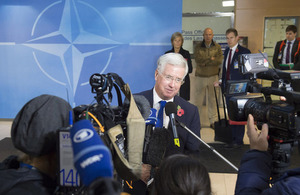UK maritime personnel train the Libyan Coastguard
UK Armed Forces personnel will tomorrow begin operations to help train the Libyan Coastguard, the Defence Secretary Michael Fallon has confirmed.

Defence Secretary Michael Fallon speaks to the media at NATO's October meeting of defence ministers
The training, previously announced at the G7 in May 2016, will see a small team of Royal Navy personnel provide training to the Libyans in coastguard activities, such as search and rescue. As part of the EU’s mission in the Mediterranean, Operation Sophia, the training will increase Libya’s ability to secure its own borders by increasing their Coastguard’s ability to disrupt people smuggling and illegal arms trafficking in and around Libya.
Specialist trainers from the Royal Navy will also teach the Coastguard in naval expertise, such as how to sail alongside, board and inspect vessels.
The training programme underlines the UK’s support to Operation Sophia, which aims to disrupt the activities of the smugglers who continue to exploit migrants trying to reach Europe.
Defence Secretary Michael Fallon said:
People smuggling across the Mediterranean saw 3,000 people drowned at sea last year. To help prevent more lives being lost, the Royal Navy will provide training support to the Libyan Coast Guard. Fighting the smuggling of people and arms will save lives and make Britain safer and more secure.
Following a thorough and effective vetting process, the training will began on Friday 28 October, and will be delivered over the next three months. The programme will take place aboard European ships.
Other British ships and personnel are involved in Operation Sophia. Earlier this month RFA Mounts Bay resumed duties patrolling the Mediterranean to counter illegal arms trafficking, taking over from HMS Diamond.
Today in Brussels the Defence Secretary followed yesterday’s announcement that RAF Typhoon jets would deploy to the Black Sea region and UK troops to the Baltic region, with discussions about a wider maritime role for NATO, working in co-operation with the EU.
He said:
Our jets and troops will help protect NATO’s flanks by air and land, and today we see a wider role for NATO at sea, helping to protect the Mediterranean and making us safer by working with the EU in tackling the flow of illegal migration, arms and potential terrorists.
Backed by a defence budget rising in real terms for the rest of this parliament, the UK is also meeting NATO’s 2% defence spending target.
Updates to this page
-
picture added
-
First published.